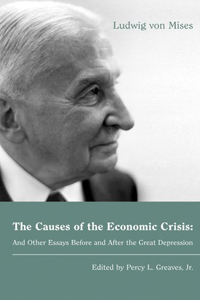 I chanced this morning on the superb collection of essays from Ludwig von Mises, The Causes of the Economic Crisis and Other Essays Before and After the Great Depression (PDF).
I chanced this morning on the superb collection of essays from Ludwig von Mises, The Causes of the Economic Crisis and Other Essays Before and After the Great Depression (PDF).
In his Stabilization of the Monetary Unit—From the Viewpoint of Theory written in 1923, he showed considerable foresight:
Only the hopelessly confirmed statist can cherish the hope that a money, continually declining in value, may be maintained in use as money over the long run. That the German mark is still used as money today [January 1923] is due simply to the fact that the belief generally prevails that its progressive depreciation will soon stop, or perhaps even that its value per unit will once more improve. The moment that this opinion is recognized as untenable, the process of ousting paper notes from their position as money will begin. If the process can still be delayed somewhat, it can only denote another sudden shift of opinion as to the state of the mark’s future value. The phenomena described as frenzied purchases have given us some advance warning as to how the process will begin. It may be that we shall see it run its full course.
Obviously the notes cannot be forced out of their position as the legal media of exchange, except by an act of law. Even if they become completely worthless, even if nothing at all could be purchased for a billion marks, obligations payable in marks could still be legally satisfied by the delivery of mark notes. This means simply that creditors, to whom marks are owed, are precisely those who will be hurt most by the collapse of the paper standard. As a result, it will become impossible to save the purchasing power of the mark from destruction.
And in 1946, he commented on using easy money and deficit spending to stimulate the economy after a long period of cheap credit (The Trade Cycle and Credit Expansion):
In discussing the situation as it developed under the expansionist pressure on trade created by years of cheap interest rates policy, one must be fully aware of the fact that the termination of this policy will make visible the havoc it has spread. The incorrigible inflationists will cry out against alleged deflation and will advertise again their patent medicine, inflation, rebaptizing it re-deflation. What generates the evils is the expansionist policy. Its termination only makes the evils visible. This termination must at any rate come sooner or later, and the later it comes, the more severe are the damages which the artificial boom has caused. As things are now, after a long period of artificially low interest rates, the question is not how to avoid the hardships of the process of recovery altogether, but how to reduce them to a minimum. If one does not terminate the expansionist policy in time by a return to balanced budgets, by abstaining from government borrowing from the commercial banks and by letting the market determine the height of interest rates, one chooses the German way of 1923.
The Bank of England hopes to avoid all this by manipulating people’s expectations about inflation and GDP growth. I don’t think it can be done – too many commentators can see through it.
Nevertheless, they are going to give it a try. The best that can be said for it in the context of the German experience which Mises predicted and lived through is that at least if coming events are well understood, contemporary errors may at last produce the paradigm shift in economic thought necessary to put us on a more just and moral economic path.



















It is very depressing to see the Tory govenment pursue such statist policies: Help to Buy, weak border controls.